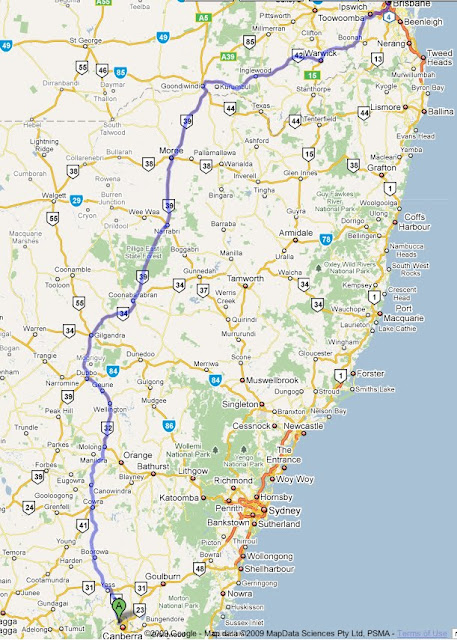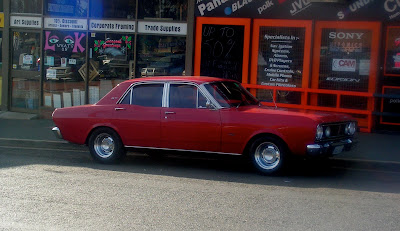I have divided the review into 'The Good', 'The Bad', 'the Could Be Done Better' and 'Overall'.
This bus could be any bus. Redex buses need a big RED sticker/magnet on the FRONT of the bus and adjacent to the front door.
The Good
The Redex services arrived close to or exactly to its scheduled departure times from Gungahlin, Civic and Kingston. The services ran quickly and frequently. I used it six times over two weeks and experienced no 'cancelled' (ie: the bus just simply never turns up) services which sometimes happens on other Action routes.
All Redex buses I caught were new and comfortable. I was able to get a seat in every one. The aircon wasnt working properly in one vehicle, and I did alert the driver who said he would tell the depot.
The onboard destination verbal and visual announcements are a good idea, and work well. They also add to the 'tram-like' feel of the Redex service.
The 'limited stops' works well. It adds to the 'tram-like' concept Action are trying to sell, and speeds up the service trip time. These trip times are averaged over 6 trips in peak hour over a two week period.
Gungahlin to Civic 17 minutes
Civic to Kingston 16 minutes
Kingston to Civic 19 minutes
Civic to Gungahlin 20 minutes
Canberra's best bus stop in Gungahlin Town Centre. It is not a dedicated Redex stop, despite appearances.
The Bad
The signage regarding Redex is poor. Not only are the Redex buses themselves no different externally from other Action buses, but Redex stickers all over a bus stop does not mean it is a Redex only bus stop. This can cause confusion and can be easily remedied.
Redex needs a separate platform at Interchanges. As can be seen from the photo above, at first glance this appears to be a Redex only bus stop. It is not. There is also no dedicated Redex platform in Civic.
Redex buses are not distinct from regular Action buses. As can be seen from the photo above, this could be any other Action bus. From a distance the service number cannot be seen distinctly. The scrolling Redex message is also indistinct. Action need to plaster a big red magnetic or vinyl sign across the front of the bus, or place a large redex placard in the front window of the bus, and also adjacent to the passenger boarding door.
This can easily be done, those ridiculous Movember bus stickers on the front of buses indicate that there are no safety or policy issues, its just a management decision to make the Redex buses more distinct, that needs to be taken, and the signage applied.
Because of the problems mentioned regarding inadequate signage, there are confused passengers. This confusion consists of passengers sailing past what they thought were stops and also asking if the bus goes somewhere it doesn't. Now I know all bus drivers get asked questions by passengers, but a distinct coloured bus clearly NOT a regular Action bus would resolve at least 80% of confused passenger questions. It would also stop the passengers at non-Redex stops from hopelessly trying to wave down a Redex bus.
The biggest problem I can see with Redex continuing past the funded trial is limited passenger numbers.
These numbers are averaged over 6 trips in peak hour over a two week period.
Gungahlin to Civic 3
Civic to Kingston 6
Kingston to Civic 15
Civic to Gungahlin 12
I am not sure how Action are capturing passenger trip data, but they did recently trumpet increased passenger figures, so I assume they are keeping a close eye on this data.
Automated destination announcements linked to GPS - this works well.
Could be done better
There are several small things that Action could do immediately which would raise the profile of Redex and differentiate the Redex service from regular Action bus routes.
- Separate Redex platforms at interchanges
- More distinct Redex buses
- More Redex advertising/promotion
Apart from that I think Action are doing a very good job in delivering a rapid-transit-lite service for Gungahlin commuters. It is a service that should have been delivered at least 10 years ago.
Kingston railway station bus stop.
Overall
Despite limited patronage on the services I was on, Redex is a good model and seems to be working. For public transport systems to work effectively, they must be Comfortable, Frequent and Attractive. I found the Redex service to satisfy all three criteria. The service is frequent enough to not have to worry about timetables, which is a good thing. The buses are comfortable, with plenty of seating, and the trip advice display is a nice touch. I had a friend who is a non public transport user call me from the Redex bus trip he was on and talk it up (although he also mentioned confused passengers). If non-PT users can be converted, then that is a good thing.
Extending the idea.
Tuggeranong, Belconnen and Woden already have direct services from their town centre interchanges to Civic. Redex is really a service which should have been in place at least ten years ago to offer the same service to Gungahlin commuters. Despite that observation, Redex is different in that it has limited stops and runs a slightly longer route to cater for commuter destinations. This fits in with the idea that public transport should link population and employment centres, and that minimising having to change vehicle or mode makes PT more attractive (and adds to quicker trip times).
No doubt if Redex is extended, services like 216/217 can be converted to 'Redex' quite easily.
When first announced, Redex was to operate from the other Canberra town centres. This was changed due to funding problems (as reported in my previous blog post on Redex). If the redex trial in Gungahlin proves successful it should be rolled out across the Action network. As Jon Stanhope said on Sep 29 2009:
"The significant change in relation to the trial is that we're trialing it in a form that we would hope to roll it out and that is an all-day service, 15 minute frequency along those major routes.
"That's what we're trialing and if it's successful, if the people of Canberra respond, then of course that's the model that we'll roll out to Belconnen and Tuggeranong."
If this eventuates, the business case for dedicated Redex buses quite clearly distinct from regular Action services would then exist. By making the Action network more closely resemble a mass-transit network, fed by feeder routes, Canberra's public transport system would be more efficient and deliver quicker trip times. These are important in attracting increased patronage.
I urge Action executives to pick up some of my suggestions and to act on them, Redex needs to be a success so that the limited stop, rapid-transit model can be extended to other Canberra population centres.


















































